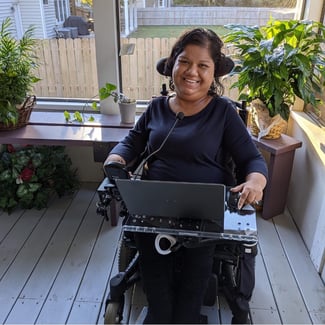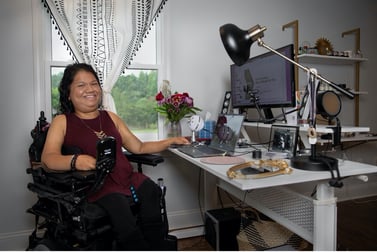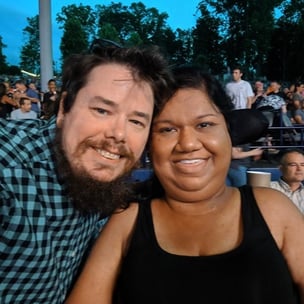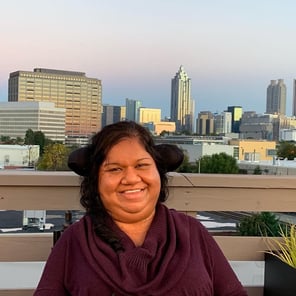Disabled Women Make History: Liz Persaud
“Equality and inclusiveness aren’t difficult ideas, nor does it need to be something that we have to prepare for in the far future. It can happen now, but we all have to do what it takes to contribute to building that inclusive society.”
 Liz Persaud talks sex, assistive technology, and persistence as a disabled woman leader.
Liz Persaud talks sex, assistive technology, and persistence as a disabled woman leader.
“The most frustrating barrier that I’ve encountered as a disabled woman out in the world would probably be the fact that I still look around any environment that I am in to see if I find someone that looks like me,” says Liz Persaud, a first-generation Guyanese American, board member of NMD United, and expert on assistive technology. “As a marginalized woman with a disability, it’s a rare instance, but a gem when it happens.”
Liz has been leading the way in assistive technology (AT) spaces for decades. In fact, in December of 2021, Liz celebrated 20 years of working for Tools for Life, Georgia’s Assistive Technology Act Program. Over the past two decades, Liz has had opportunities to engage with developers, researchers, engineers, and others that are creating and educating on assistive technology and share anecdotes on real-life examples that can influence their designs.
“Whenever I’m engaging in thoughtful discussion with others about it, I try to mention how I use an average of 30 pieces of AT every day, from the time I wake up, to the time I go to bed, and even in the middle of the night,” Liz enthusiastically explained. “Technology is incredible, but technology that can benefit people with disabilities to be more self-sufficient and successful, is a game-changer and one that perpetuates positive and independent living.”
Some of the technologies Liz uses to be independent include smart home technologies where she uses her voice to control her environment, speech to text software for writing, a power wheelchair, an adjustable bed that provides pressure relief, an accessible van that has taken her and her husband all over the country, and lots more.
 “Having the perspective of someone who uses the technology every day, is exactly what is needed in this field. ‘Nothing about us without us!’ continues to be important words that I share with leadership all of the time,” Liz shared. “If more people with disabilities contributed to the conversation of thoughtful and accessible design, our world would be built more inclusively.”
“Having the perspective of someone who uses the technology every day, is exactly what is needed in this field. ‘Nothing about us without us!’ continues to be important words that I share with leadership all of the time,” Liz shared. “If more people with disabilities contributed to the conversation of thoughtful and accessible design, our world would be built more inclusively.”
In addition to her passion for AT, Liz is also enthusiastic about exploring sex, intimacy, and relationships as they relate to disability. She particularly enjoys delving into conversations about these topics that are often still considered taboo.
“Sex and intimacy are something that I struggled with as a teenager and young adult, as did many people with disabilities. For me, it was especially difficult witnessing all of my friends moving through life, seemingly, with no effort or struggle in this area,” Liz divulged candidly. “Exploring relationships and sexuality while being disabled can be easy and incredible. It certainly is a right that anyone, who welcomes it, deserves.”
Liz is all too familiar with how ableism is tied into sexuality and relationships. She’s had relationships that have helped her flourish and see herself as sexy and worthy – but she’s also lived with society’s ableism telling her that because of her disability, she is “too much” for other people to handle dating.
Liz shared an experience with a person that she had dated shortly before meeting her husband that she’ll never forget. “They were kind, affectionate, and told me regularly that they were happy to buy me gifts, cook dinners, and watch movies in their apartment, as long as they didn’t have to go in public with me. When I asked why, the answer was that I received “too many looks and attention” when I’m out, and they did not like seeing that or being a part of it. While I handled the situation with grace, I felt devastated,” Liz confessed. “I had just graduated from college, about to start a new job, and felt like this was what my adult years had in store for me when it came to relationships and intimacy. Was everyone I was attracted to going to treat me that way?”
 While that experience crushed Liz, she knew her worth and moved on from that relationship. Later that year, she met her husband, Ben, online through a Dave Matthews Band Community Forum. She asked Ben a general question, and they have not stopped talking ever since! They have been together for 19 years and married for 7! However, because Liz has a visible disability and Ben does not, people often make comments to them about their relationship, including comments that infer that Liz is a burden or that Ben is making a “sacrifice” by being with Liz.
While that experience crushed Liz, she knew her worth and moved on from that relationship. Later that year, she met her husband, Ben, online through a Dave Matthews Band Community Forum. She asked Ben a general question, and they have not stopped talking ever since! They have been together for 19 years and married for 7! However, because Liz has a visible disability and Ben does not, people often make comments to them about their relationship, including comments that infer that Liz is a burden or that Ben is making a “sacrifice” by being with Liz.
“I believe that because Ben does not appear to have a disability and because mine is visible that the world is curious about our match and the way we navigate life together,” Liz explained. “The word “sacrifice” passes a judgment that Ben is unable to do the things in life that he loves and wants to do because he is with me. Judgment like this can be dangerous and cause someone to engage in negative thinking. This is one of many examples that has occurred in my life that makes me believe that conversations need to happen around disability, relationships, sex, and intimacy.”
For Liz, it’s not starting these conversations that are the hard part – it’s often being the only disabled person (and more often the only marginalized disabled woman) in the room where these conversations are happening that makes it especially hard.
“The most frustrating barrier that I’ve encountered as a disabled woman out in the world would probably be the fact that I still look around any environment that I am in to see if I find someone that looks like me. As a minority woman with a disability, it’s a rare instance, but a gem when it happens,” Liz sighed. “I’m tired of categories and separate living for people with disabilities. This only happens because the general public can be afraid of the unknown. People with disabilities are professionals, creators, makers, storytellers, artists, scientists, innovators, designers, advisors, and so much more.  People with disabilities are people.”
People with disabilities are people.”
Liz also offered a solution: “Look beyond what you see and treat others the way you want to be treated. Equality and inclusiveness aren’t difficult ideas, nor does it need to be something that we have to prepare for in the far future. It can happen now, but we all have to do what it takes to contribute to building that inclusive society.”
When asked if she had any specific advice for girls and women with disabilities who want to become leaders, Liz replied, “Be persistent and always be truthful to yourself. Move through the world with confidence, no matter how your core might shake. Confidence in anyone, but especially seen in women with disabilities, is empowering and will help you to be heard.”
Join Our Movement
What started as an idea has become a national movement. With your support, we can influence policy and inspire lasting change.
Become an Advocate